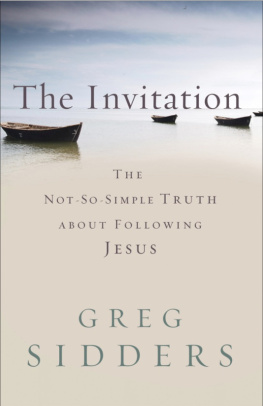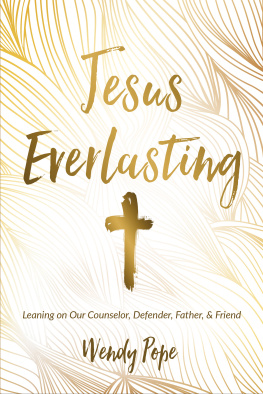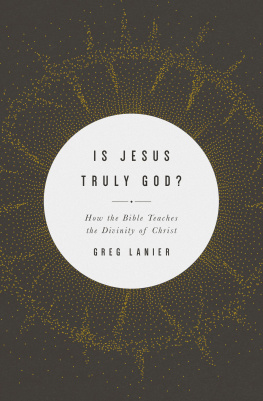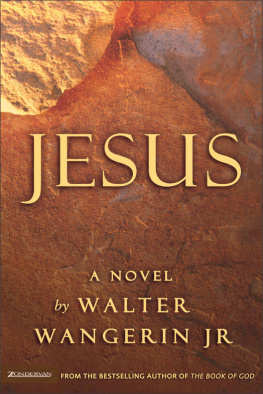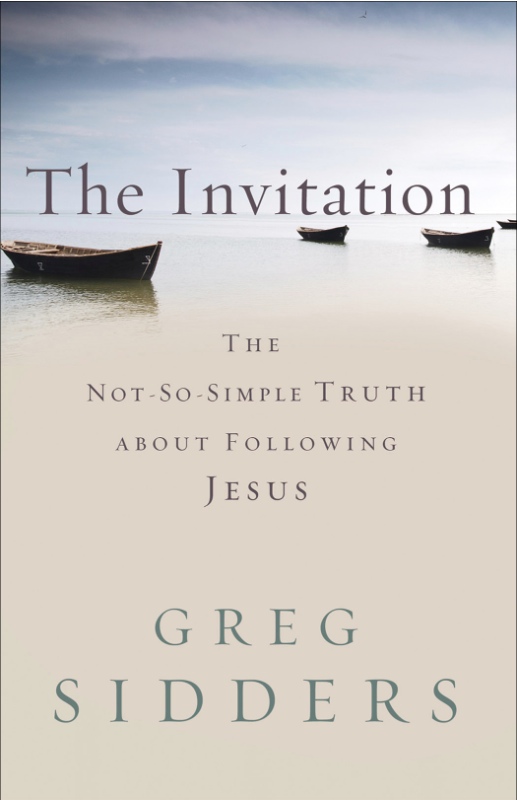2011 by Greg Sidders
Published by Revell
a division of Baker Publishing Group
P.O. Box 6287, Grand Rapids, MI 49516-6287
www.revellbooks.com
E-book edition created 2011
All rights reserved. No part of this publication may be reproduced, stored in a retrieval system, or transmitted in any form or by any meansfor example, electronic, photocopy, recordingwithout the prior written permission of the publisher. The only exception is brief quotations in printed reviews.
ISBN 978-1-4412-1491-1
Library of Congress Cataloging-in-Publication Data is on file at the Library of Congress, Washington, DC.
Unless otherwise indicated, Scripture quotations are taken from the Holy Bible, New International Version, NIV. Copyright 1973, 1978, 1984 by Biblica, Inc. Used by permission of Zondervan. All rights reserved worldwide. www.zondervan.com
Scripture marked GNT is taken from the Good News TranslationSecond Edition Copyright 1992 by American Bible Society. Used by permission.
Scripture marked NASB is taken from the New American Standard Bible, Copyright 1960, 1962, 1963, 1968, 1971, 1972, 1973, 1975, 1977, 1995 by The Lockman Foundation. Used by permission.
Scripture quotations marked NIrV are from the Holy Bible, New International Readers Version. NIrV. Copyright 1995, 1996, 1998 by Biblica, Inc. Used by permission of Zondervan. All rights reserved worldwide. www.zondervan.com
Scripture marked NLT is taken from the Holy Bible , New Living Translation, copyright 1996. Used by permission of Tyndale House Publishers, Inc., Wheaton, Illinois 60189. All rights reserved.
Scripture marked TNIV is taken from the Holy Bible, Todays New International Version . TNIV. Copyright 2001, 2005 by Biblica, Inc. Used by permission of Zondervan. All rights reserved worldwide. www.zondervan.com
Scripture marked WEB is taken from The World English Bible , a public domain modern English translation. http://ebible.org
Italics within Scripture quotations reflect the authors emphasis.
To
Sean, Brian, and Kyle,
disciples of Jesus
Introduction
Soon after I decided to follow Jesus, I started avoiding him at all costs.
I want to tell you how it happened, because I think you might recognize your own story in mine.
I was a sophomore in college, living in a godless dormitory and dabbling in its multiple choices. But two things kept me from enjoying myself: anxiety about death and proximity to Bob, the Christian on my floor who always abstained but never judged.
One day in the dining commons, Bob walked past me with his food tray, stopped, and said, Id like to come by your room tonight. Theres something I want to talk to you about.
Uh, okay. I could not imagine what he wanted to talk about.
It turned out to be the most important conversation of my life. He shared with me the secret of immortality. The simple truth that Jesus died for me so that I could live forever was something I had never heard in church. It spoke to my deepest need and most paralyzing fearand yet I stubbornly rejected it. I pray every day, I said to Bob, and I dont think God is going to send me to hell just because I dont have Jesus as my go-between.
Rather than argue with me, Bob said, Well, since you pray every day, why dont you ask God if he thinks you need Jesus?
I didnt see any harm in that, so after Bob left, I prayed. God, I know I dont need Jesus, but if you think I do, tell me. I repeated the same prayer a couple dozen times over the next several weeks. I didnt hear any heavenly voice, so I concluded that God agreed with me.
It was long after I stopped asking that God answered. I was lying in bed late at night when I did hear a voicenot with my ears but with my heart: Greg, you have been running away from me long enough. Now, turn around and follow me.
I cannot explain how I knew it was the voice of Jesus (any more than you could explain the times God has spoken to you), but I knew. I responded pretty much like I did when Bob invited himself to my dorm room. Uh, okay.
In an instant a flash flood of joy engulfed me. I knew, with the certainty that only the Spirit of God can give, that I was going to live forever.
And the exhilaration lingered. I joined an on-campus Christian group, made new friends, and bought my first Bible, one with the words of Christ in red.
And then I did something that turned my euphoria into vertigo. I read the words in red.
Hate your father and mother.
Take up your cross.
Do good to those who hate you.
Sell your possessions.
Be slave of all.
I discovered that this man who called me to follow him was a radical. Either that or (please, dear God) I had purchased a defective Bible. I borrowed my friends Bibles and compared them to mine. Sure enough, theirs said the same thing. I pointed to Jesuss most shocking statements and asked them, Have you read this?
Uh-huh, they would yawn.
I couldnt understand why they werent as appalled as I was. It was unthinkable to me to actually do what Jesus said. And yet I wanted to be a Christian (because I wanted to go to heaven). So I did the only sensible thing: I skipped the words in red. Well, not all of them, but if they got too upsetting, I simply picked up where the black ink resumed. I had wonderful devotions in the Epistles of Paul during this time.
Then one day a simple question popped into my mind: How can I call myself a Christian if I dont follow Christ?
That was when I made an apprehensive reentry into the red zone. Soon afterward, I read the words of Jesus in Matthew 11:2830: Come to me, all you who are weary and burdened, and I will give you rest. Take my yoke upon you and learn from me, for I am gentle and humble in heart, and you will find rest for your souls. For my yoke is easy and my burden is light.
Maybe I should have been comforted by those words, but I wasnt. I was confused. How could Jesus call the yoke that to me seemed so hard easy? How could he say that the burden I found so heavy was really light? At the heart of Christs invitation is the verb learn . If you were to open a Greek New Testament to Matthew 11:29, you would see the word mathete . Its a verb that comes from the same root as the noun mathetes , which we translate disciple. Jesus said that being his disciple is easy and light .
Seriously? Have you read those passages in which Jesus describes what his disciples do? There are seven of them in the Gospelsso, yes, I suppose they are light in volume and easy to memorize, but on the commitment scale, they are among the heaviest statements Jesus ever made. So where is the ease and lightness Jesus promised?
Its in the doing of what we find daunting.
I have discoveredor, I should say, I am discoveringthat the teachings of Jesus seem hard and heavy until I actually do them. Thats when I say, Well, that wasnt so bad. In fact, Ive never felt better. Once I penetrate the ominous mirage, I break through to the soul-rest I long for. Those passages that used to intimidate me have become precious to me, and I cannot imagine reverting to a mild version of Christianity with all the hard sayings of Jesus edited out. How hollow that would be.
Might you use that wordhollowto describe your Christian experience? If so, could Christ-avoidance be the cause? Is it possible that you have been either frightened away by his most revolutionary teachings or insulated from them by tidy evangelical theology? What might happen if you were to take a fresh, unfiltered look at the discipleship sayings of Jesus? What if you read the Gospels as if the rest of the New Testament didnt exist? Because, remember, it didnt exist during the ministry of Jesus. What if you had to deal with Jesus on his own terms?

